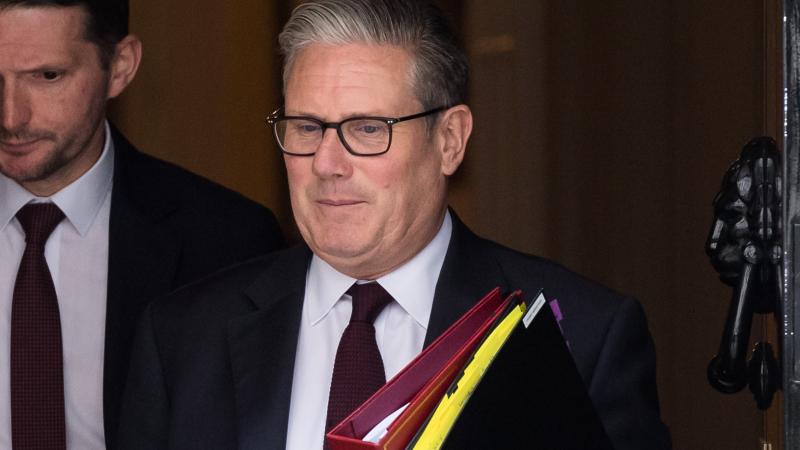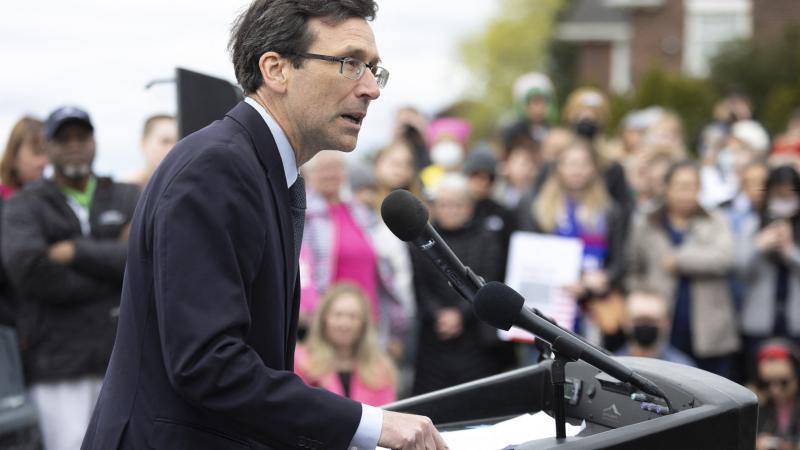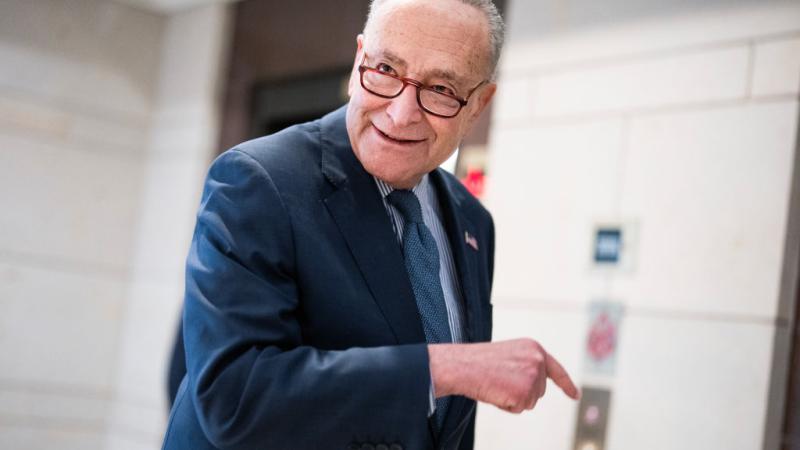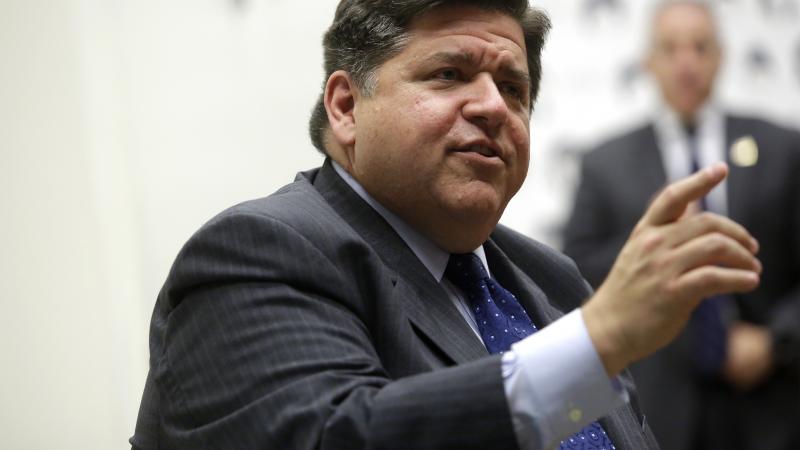Trump threatens Musk’s government contracts — and SpaceX founder’s China ties may get new scrutiny
Battling Billionaires: The Trump-Musk feud continues, with Musk threatening to primary GOP congressmen who vote for the Big Beautiful Bill while Trump hints at pulling Musk's federal contracts. Will the SpaceX founder's China ties come into play?
President Donald Trump has suggested he may end Elon Musk’s lucrative federal government contracts, and the SpaceX founder’s Chinese business dealings may get renewed regulatory scrutiny given that Trump has suggested that Musk may be “susceptible” to influence because of those China ties.
Musk is heavily invested in China to make and sell his Tesla electric cars, and he has repeatedly praised the Chinese people while complimenting the Chinese Communist Party nine years ago for its economic accomplishments— even as the Pentagon and NASA are now heavily reliant upon another Musk company, SpaceX, to launch satellites and astronauts into space.
Ironically, the president, who fought off baseless allegations that he was under Russia's influence, said in March that Musk might be “susceptible” to being influenced based on his lucrative Tesla business in China. Months after Trump’s remark, a public social media feud has developed between the two men — with Trump threatening to pull Musk’s government contracts as the SpaceX owner threatened to campaign against any Republicans who vote for Trump’s “One Big Beautiful Bill.”
Musk’s lucrative government contracts and controversy over his security clearance give Trump potential leverage over the SpaceX founder in their fight.
Battling against the "Big Beautiful Bill"
Musk has spent recent days battling against Trump’s big bill — which Musk has portrayed as fiscally irresponsible and claimed “will destroy millions of jobs in America” as it “gives handouts to industries of the past while severely damaging industries of the future.”
Trump's riposte is to suggest that Musk’s opposition is motivated by personal financial interests, because the bill ends electric vehicle mandates. “Elon Musk knew, long before he so strongly Endorsed me for President, that I was strongly against the EV Mandate. It is ridiculous, and was always a major part of my campaign. Electric cars are fine, but not everyone should be forced to own one,” Trump said on Truth Social on Tuesday.
“Elon may get more subsidy than any human being in history, by far, and without subsidies, Elon would probably have to close up shop and head back home to South Africa. No more Rocket launches, Satellites, or Electric Car Production, and our Country would save a FORTUNE. Perhaps we should have DOGE take a good, hard, look at this? BIG MONEY TO BE SAVED!!!” Trump said on his Truth Social platform.
Musk said on his competing social media platform X on Wednesday that Trump’s argument was “just plain wrong [shrug emoji]” and “so disappointing.”
Senate Republicans on Tuesday passed its version of Trump's big bill. The vote was 50-50, with Vice President JD Vance casting the tie-breaking vote. The bill then returned to the GOP-led House for final votes.
Musk, China, and electric cars
This year, Musk has repeatedly framed the issues of electric vehicles and solar power in relation to China. The richest man in the world, according to the Forbes Billionaire List, tweeted in February that “China is by far the leader in electric cars and solar power produced.” He tweeted in April that “China is a much bigger consumer of manufactured goods than the United States. This year, Chinese consumers will buy more cars than America and Europe combined.”
Musk responded in May to claims that in just the last five years, China had allegedly taken over the car-making market, replying that “China is also the biggest car buyer! This year, China will BUY more cars than America and Europe combined.”
And he said in June that “most people don’t realize how much solar power China has installed. Enough to power half of America!”
“The fundamental challenge is that China has almost 4 times the population of the US and their GDP per capita is trending to roughly approximate that of the US. If this trend continues, China will have an economy ~4X bigger. Even if their GDP/capita growth tapers off, China’s economy will be at least 2X to 3X bigger than America. Simple math,” Musk tweeted last month, saying in another tweet that “solar power in China will exceed ALL sources of electricity combined in the USA in 3 to 4 years. Wake up call.”
Stakes get higher in the feud
This week, while speaking to reporters outside the White House, Trump was asked if he would deport Musk. “I don’t know, I think we'll have to take a look,” Trump replied. “We might have to put DOGE on Elon. You know what DOGE is? The monster that might have to go back and eat Elon. Wouldn’t that be terrible? He gets a lot of subsidies… but Elon is very upset that the EV mandate is going to be terminated… Not everyone wants an electric car.”
Musk replied on Twitter: “So tempting to escalate this. So, so tempting. But I will refrain for now.”
“What good is Doge saving $160B when this bill increases the debt ceiling by $5T? It makes mockery of the work,” Musk said on Twitter on Tuesday, also asking, “And how are we supposed to reach Mars if America goes de facto bankrupt?”
While in Florida touring the “Alligator Alcatraz” detention facility for illegal immigrants, a reporter said Musk was attacking Trump's signature bill again and asked if Republicans would be swayed by the SpaceX founder and his money.
“No, I don’t think so,” Trump replied. “I think what’s going to happen is DOGE is going to look at Musk, and if DOGE looks at Musk we’re going to save a fortune. … I don’t think he should be playing that game with me.”
Musk did not respond to requests for comment made by Just the News via Tesla and SpaceX.
Musk’s Pentagon meeting marred by “Fake News” and China concerns
Musk’s meeting in March at the Pentagon caused a bit of a stir, and resulted in Trump pointing to his concerns about Musk’s potential conflicts of interest related to China.
The New York Times in March cited anonymous “U.S. officials” when reporting under a headline that read “Pentagon Set Up Briefing for Musk on Potential War with China" and added that "The access would be a major expansion of Elon Musk’s government role and highlight his conflicts of interest.”
Trump quickly said on Truth Social that “China will not even be mentioned or discussed. How disgraceful it is that the discredited media can make up such lies.”
Musk seemed to concur with Trump, at least as far as distrust of legacy media is concerned. He tweeted at the time that the outlet “is pure propaganda. Also, I look forward to the prosecutions of those at the Pentagon who are leaking maliciously false information to NYT. They will be found.”
Defense Secretary Pete Hegseth confirmed on Twitter that Musk would be going to the Pentagon for a meeting, “but the fake news delivers again — this is NOT a meeting about ‘top secret China war plans.’ It’s an informal meeting about innovation, efficiencies & smarter production. Gonna be great!”
Pentagon chief spokesman Sean Parnell similarly tweeted at the time that “this is 100% Fake News. Just brazenly & maliciously wrong. Elon Musk is a patriot. We are proud to have him at the Pentagon.”
Trump again batted down The New York Times report about an alleged China war plan briefing when speaking to reporters in the Oval Office the next day — where he raised concerns about Musk’s business ties in China.
“I don’t want to show it to anybody. You know, you’re talking about a potential war with China. … I don't want other people seeing — anybody seeing — potential [plans for] war with China. We don't want to have a potential war with China, but I can tell you if we did, we're very well-equipped to handle it, but I don’t want to show that to anybody,” Trump said. “But certainly, you wouldn't show it to a businessman who is helping us so much and who is a great patriot… But I certainly wouldn’t want — you know, Elon has businesses in China, and he would be susceptible, perhaps, to that. But it was such a fake story.”
Elon Musk’s government contracts mostly with SpaceX
Musk-controlled companies — mainly SpaceX — have received billions of dollars in federal contracts, with some of the spending aimed at confronting the growing China challenge. Reuters reported last month that “$22 billion of SpaceX's government contracts are at risk” if Trump goes through with his threat to cut off Musk’s federal funding.
SpaceX is not publicly traded, but financial news outlets report that Musk owns a significant portion of SpaceX's equity, but not entirely. His holdings are estimated to be around 42 to 54%.
It was reported by The Washington Post this year that SpaceX, Tesla, and other Musk businesses “have received at least $38 billion in government contracts, loans, subsidies, and tax credits” over the years.
The New York Times also reported this year that SpaceX “is already being paid billions of dollars by the Pentagon and federal spy agencies to help the United States build new military satellite networks to try to confront rising military threats from China” and that “the company separately has been paid hundreds of millions of dollars by the Pentagon that now relies heavily on SpaceX’s Starlink satellite communications network for military personnel to transmit data worldwide.”
The outlet said this did not include classified funding SpaceX received from the National Reconnaissance Office, “which has hired the company to build a new constellation of low-earth orbit satellites to spy on China, Russia and other threats.” Reuters and The Wall Street Journal both said that the secret satellite network is being built by SpaceX's Starshield under a $1.8 billion contract signed in 2021 with the office.
An analysis by Newsweek laid out the amount of NASA-related funding provided to Musk’s SpaceX, noting that “since 2015, SpaceX has received more than $13 billion in NASA contracts.” The outlet said SpaceX had received contracts related to the NASA Artemis Moon mission, NASA commercial crew transportation and commercial resupply, the NASA International Space Station de-orbit vehicle, and NASA's Launch Services Program. The outlet noted that SpaceX also received funding to help with the U.S. Air Force Rocket Cargo Program, the U.S. Space Force’s National Security Space Launch, and the Pentagon’s use of Starlink.
As the Trump-Musk feud began to heat up in early June, NASA spokesperson Bethany Stevens tweeted that “NASA will continue to execute upon the President’s vision for the future of space. We will continue to work with our industry partners to ensure the President’s objectives in space are met.”
Musk’s security clearance saga
During his second term, Trump has revoked the security clearances of numerous high-profile former government officials and others, including Joe Biden, Kamala Harris, Hillary Clinton, Antony Blinken, Jake Sullivan, as well as Democratic Party-aligned self-styled "Resistance" lawyers such as Mark Zaid. It remains to be seen whether he may do the same with Musk.
Anonymous officials told The New York Times in December of last year that “until about 2018, he [Musk] held a midlevel secret clearance at SpaceX” and that, in 2018, SpaceX “applied for a higher level of clearance known as ‘top secret’ on his behalf."
The Times also reported that Musk and SpaceX “have repeatedly failed to comply with federal reporting protocols aimed at protecting state secrets, including by not providing some details of his meetings with foreign leaders” and that the Defense Department’s Office of Inspector General “opened a review into the matter” in 2024, while the Air Force and the Pentagon’s Office of the Under Secretary of Defense for Intelligence and Security “separately initiated reviews” in November.
The outlet added that the Defense Counterintelligence and Security Agency “took more than two years — an atypical length that was more than double the average time — to approve Mr. Musk’s "top-secret security clearance” and “his business interests in China, where Tesla has a factory, were also a concern” during the review.
White House Press Secretary Karoline Leavitt said in early February that “as for his security clearance, I’m not sure” what type of security clearance Musk has, and that “I’m not sure” if he passed a background check.
Musk tweeted later that month that “I’ve had a top secret clearance for many years and have clearances that themselves are classified. That said, FAR too much information is made ‘classified’. If something is easily found online or patently obvious, it should NOT be classified. This impedes effective communication within the government.”
Tesla’s growing China-based production and revenues
Musk’s Tesla is heavily reliant upon China both for the production of his cars and for their sales. Tesla’s Securities and Exchange Commission filings reference Tesla’s Gigafactory and Megafactory plants in Shanghai, China. The SEC filings detail one of the loans which Tesla received from China as well as a lease agreement Tesla struck in China.
Tesla’s global revenue figures for 2024, found in SEC filings from January, show Tesla received $47.725 billion from U.S. sales, $20.944 billion from Chinese sales, and $29.021 billion from sales elsewhere internationally. By way of comparison, prior SEC filings by Tesla showed revenue figures were $14.87 billion, $12.65 billion, and $15.2 billion from the U.S. in 2018, 2019, and 2020, respectively, compared to Tesla’s revenue of $1.76 billion, $2.98 billion, and $6.66 billion in China during the same timeframes.
The Wall Street Journal reported that “in 2018, Musk visited Shanghai, where Li Qiang then served as Communist Party secretary, to sign a deal for Tesla to build a $7 billion plant in the city—its first overseas plant” and reported that “then Premier Li Keqiang even took a Tesla for a spin within the gated Zhongnanhai leadership compound in 2019.”
The English-language online version of The People’s Daily, an official newspaper of the Central Committee of the CCP, said in January 2019 that “Chinese Premier Li Keqiang met with Tesla CEO Elon Musk … [with Li] saying that China welcomes enterprises from all countries to expand investment cooperation” and that “Tesla … broke new ground with its Shanghai factory, becoming the first to benefit from a new policy allowing foreign carmakers to set up wholly-owned subsidiaries in China." Li reportedly called Musk his “old friend” during a 2024 meeting in China.
It was reported by Bloomberg News in 2019 that Tesla “secured as much as $521 million in loans from Chinese banks to build a vehicle and battery factory in the country.” Bloomberg Tax reported in 2021 that “the Shanghai government granted Tesla’s Gigafactory Shanghai subsidiary a beneficial corporate income tax rate of 15% for 2019 through 2023... This compares with the 25% statutory corporate income tax rate in China.”
Tesla’s Shanghai Gigafactory “has the potential to produce over 950,000 Model 3/Model Y per year,” according to an Inside EVs report last year. The Washington Post reported in February that Tesla had “opened an enormous $200 million battery plant in Shanghai, near its carmaking Gigafactory.”
It was reported by The Wall Street Journal in March 2021 that China was restricting the use of Tesla’s vehicles for the military and state-owned companies and that Musk reportedly assured Chinese politicians the company would not provide the U.S. with Chinese data.
Musk also met with China’s top diplomat in the U.S. in California in March 2022, where they took a spin in a Tesla. Then-Chinese Ambassador Qin Gang tweeted out a picture of Musk in the driver's seat and himself in the passenger seat, writing, “Took a ride in a @Tesla Model S Plaid on #autopilot. Powerful model, but smooth ride!”
In a since-deleted post, Tesla China replied to Qin with its own tweet, saying in Chinese, “Thank you Ambassador Qin Gang, we will continue to work hard.” The Tesla account included an emoji of a flexing bicep and added, “Look up and think beyond!”
The CCP’s People’s Daily said in June 2023 that Musk had visited his Tesla Shanghai Gigafactory, and that Musk told Chinese workers there that "throughout the world, the cars we produce here are not just the most efficient reproduction, but also the highest quality” and that the Shanghai Gigafactory was viewed as a "role model" for Tesla's other factories both in the U.S. and elsewhere.
The CCP house organ also said that month that “Chinese State Councilor and Foreign Minister Qin Gang met with Tesla CEO Elon Musk … in Beijing” and that “Musk said the U.S. and China share intertwined and inseparable interests. Tesla opposes decoupling and is willing to continue to expand its business in China and share the country's development opportunities.”
Musk has repeatedly used his X account to promote Tesla’s operations in China. He tweeted in August 2021 that “Tesla China rocks!” and in December 2021 that “Tesla China has done amazing work.” He tweeted in April 2022 that “Tesla China is doing incredible work” and in May 2022 that “the Tesla China team is amazing. Musk tweeted in April 2024 that “Tesla China team is great” and in April of this year that “Tesla Model Y is #1 in China.”
Tesla hits some bumps in the Chinese road
In recent months, Musk’s Tesla has seemed to struggle in China. The Wall Street Journal reported in late 2024 that “for Tesla, China is crucial. Tesla’s Shanghai plant is the company’s biggest car factory, and half its cars globally were made there in the past four quarters. During that period, Tesla sold more than 900,000 China-made vehicles, nearly one-third of which were shipped to Europe and other overseas markets.”
It was reported by Reuters in January that Tesla said that “its China sales rose 8.8% to a record high of more than 657,000 cars in 2024” and that its sales in China had “also increased 12.8% in December from a month earlier to a record high of 83,000 units.” But the outlet reported in June of this year that “a decline in Tesla's China-made electric vehicle sales extended to an eighth month in May.”
The New York Post reported in June that “exceptionally strong initial orders for Xiaomi’s YU7 electric sport utility vehicle sent shares in the automotive newcomer to a record high … and fanned speculation that Tesla may have to cut prices to fight back.” The outlet said that the Chinese competitor's car “has outsold Tesla’s Model 3 in China on a monthly basis since December.”
Nevertheless, Musk has continued to expand his investments in China. Reuters reported last month that “Tesla's first China grid-scale battery storage station using its megapack batteries will be located in Shanghai” and that the $556.8 million investment deal was signed between Tesla, China Kangfu International Leasing Co., and the local CCP government in Shanghai.
Musk's outlook on China continues to be upbeat
“China rocks, in my opinion. You know, the energy in China is great,” he said. “The people there — there’s a lot of smart, hardworking people who really — they’re not entitled, they’re not complacent, whereas I see in the United States, increasingly, much more complacency and entitlement.”
Musk tweeted in reply to the CCP commemorating its 100th anniversary: “The economic prosperity that China has achieved is truly amazing, especially in infrastructure! I encourage people to visit and see for themselves.” Musk shared his tweet with his many followers on Weibo, the China-based blogging platform.
“What attracts me most about China’s Five-Year Plan is the tremendous amount of commitment to a low-carbon economy and ultimately to a sustainable energy economy. In the Five-Year Plan, China has committed to reach peak carbon emissions sooner than 2030 and to have a sustainable energy economy by 2060. These are very aggressive goals, and I think they are great goals, and I wish more countries actually had these goals,” Musk said in March 2021 during an interview with state-run China Central Television.
Musk added, “China, I think, long-term will be our biggest market … I would like to strike an optimistic note. I am very confident that the future of China is going to be great and that China is headed towards being the biggest economy in the world and a lot of prosperity in the future, and this Five-Year Plan is gonna be a part of making that prosperity happen.”
Tesla touted a new car showroom in Xinjiang on Chinese social media on New Year’s Eve in 2021, a week after then-President Joe Biden signed a law banning imports tied to forced labor in the region, where the U.S. says the Chinese government is conducting genocide against Uyghur Muslims.
“On the last day of 2021, we meet in Xinjiang. In 2022, let us launch Xinjiang on its electric journey together!” a since-deleted post by Tesla read, while one of the pictures featured a sign saying that “Tesla [loves] Xinjiang.”
“Urumqi Tesla Center officially opened!” another Tesla post in Chinese said on Weibo. “As the first Tesla center in Xinjiang, it integrates sales, after-sales, and delivery to help Xinjiang users enjoy a one-stop service experience, and also escort Tesla owners on their western journey.”
Musk predicted in December 2021 that “China is probably going to have an economy two to three times the size of the United States” and asserted that “Tesla has a good relationship with China, and I don’t mean to endorse everything that China does any more than I would, say, endorse everything the United States does, or any country.”
Soon after Musk bought Twitter (now X) in 2022, CCP propagandists called upon the billionaire to remove the “state-affiliated media” labels from their Twitter accounts. Such labels were eventually removed from all such X accounts, although there is no evidence this was due to urging from anyone in China.
Musk penned an essay in China Cyberspace, a monthly magazine run by the Chinese government’s Cyberspace Administration of China in July 2024 and republished by the Beijing Channel Substack. Musk wrote that “I hope more people will join us in our fight to accelerate the world's transition to sustainable energy. I also welcome more like-minded Chinese partners to join us in exploring clean energy, artificial intelligence, human-machine collaboration, and space exploration to create a future worth waiting for.”
SpaceX vs. the Chinese space program
Musk is adamant that SpaceX is superior to the Chinese space program, even as he has complimented it.
It was reported by ProPublica in March that “SpaceX allows investors from China to buy stakes in the company as long as the funds are routed through the Cayman Islands or other offshore secrecy hubs, according to previously unreported court records.”
The Financial Times also reported that month that “wealthy Chinese investors are quietly funneling tens of millions of dollars into private companies controlled by Elon Musk using an arrangement that shields their identities from public view, according to asset managers and investors involved in the transactions. … The money is flowing into Musk’s non-public ventures including xAI, Neuralink, and SpaceX.”
A report late last year by the Center for Strategic and International Studies, a bipartisan foreign policy think tank, translated from Chinese a trio of papers written by Chinese military-linked professors in China. The think-tank report found that “they all conclude with a very stark assessment of the threat Starlink poses to China’s security interests.”
While Musk tweeted in May 2023 that “the China space program is far more advanced than most people realize” and in October 2024 that “China’s space program is very impressive,” in March of this year Musk insisted that SpaceX still reigned supreme. “Tonnage to orbit is all that matters. SpaceX will probably do over 90% of all Earth mass to orbit, China around 5%, and rest of world (including rest of America) about 5%,” Musk said on X. “Next year, SpaceX will probably do 95% of mass to orbit even though our competitors will also grow. In less than 10 years, SpaceX will do 99% of payload to orbit and beyond.”
Musk’s controversial views on China and Taiwan
Musk has also repeatedly made controversial foreign policy remarks about China, resulting in backlash from some officials in Taiwan.
The Chinese government endorsed Musk’s proposal eight years ago to hand over control of Taiwan to Beijing by making the independent island nation a “special administrative region” of China. “My recommendation … would be to figure out a special administrative zone for Taiwan that is reasonably palatable, probably won’t make everyone happy,” Musk said during an October 2022 interview with The Financial Times. “And it’s possible, and I think probably, in fact, that they could have an arrangement that’s more lenient than Hong Kong.”
The outlet added that “Musk reckons that conflict over Taiwan is inevitable but he is quick to point out that he won’t be alone in suffering the consequences. Tesla will be caught up in any conflict, he says.”
Taiwan’s then-ambassador to the United States, Hsiao Bi-khim, criticized Musk in a tweet: “Taiwan sells many products, but our freedom and democracy are not for sale. Any lasting proposal for our future must be determined peacefully, free from coercion, and respectful of the democratic wishes of the people of Taiwan.”
Musk also said in a September 2023 interview that “I think I understand China well. I’ve been there many times. I’ve met with senior leadership… for many years. … The fundamental thing here is really Taiwan.” He said that, from China’s point of view, Taiwan was analogous to “Hawaii or something like that — an integral part of China that is not part of China.”
The Wall Street Journal last year reported that, in late 2022, Russian leader Vladimir Putin asked Musk “to avoid activating his Starlink satellite internet service over Taiwan” as a “favor” to Chinese strongman Xi Jinping.
It remains to be seen whether Musk will continue to seemingly weigh in on China’s side in foreign policy discussions on Taiwan — especially in ways which could give the Trump administration headaches — and whether his growing business ties with China will be used by Trump as justification to pull back on some of Musk’s federal contracts, or to even administer a more drastic punishment for daring to feud with him.
The Facts Inside Our Reporter's Notebook
Links
- heavily invested
- complimenting
- heavily reliant
- suggested
- praised China
- pro-China foreign policy views
- threatening
- threatened
- lucrative
- controversy
- claimed
- motivated
- said
- said
- passed their chamber's version
- tweeted
- tweeted
- replying
- said
- tweeted
- another tweet
- replied
- replied
- said
- asking
- replied.
- reporting
- quickly said
- tweeted
- confirmed
- tweeted
- raised concerns
- reported
- reported
- reported
- said
- both
- said
- analysis
- tweeted
- revoked the security clearances
- reported
- said
- tweeted
- filings
- detail
- SEC filings
- filings
- reported
- reported
- said
- reportedly
- reported
- reported
- report
- reported
- reported
- met with
- tweeted
- said
- replied
- said
- said
- said
- August 2021
- December 2021
- April 2022
- May 2022
- tweet
- April 2024
- April of this year
- reported
- reported
- reported
- reported
- reported
- reported
- podcast
- tweeted
- tweeted
- shared
- many followers
- interview
- 14th five-year plan
- said.
- signed
- since-deleted post
- post
- predicted
- called upon
- interview
- Twitter Spaces
- tweeted
- said
- tweeted
- wrote
- reported
- reported
- report
- May 2023
- October 2024
- said
- interview
- thread
- touted
- criticized
- interview
- reported
- announced
- reported
- tweeted













